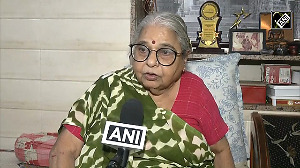 The finance ministry on Wednesday moved a step closer to the proposed Goods and Services Tax by taking the President's approval for introducing a Constitution Amendment Bill in Parliament.
The finance ministry on Wednesday moved a step closer to the proposed Goods and Services Tax by taking the President's approval for introducing a Constitution Amendment Bill in Parliament.
Even as some government departments have raised concerns on the Bill in its present form, the finance ministry has decided not to delay any further and may table it in Parliament next week.
Government officials, who did not wish to be named, told Business Standard the Bill was likely to be tabled in the Lok Sabha on March 23 or 24.
The finance ministry, along with the law ministry, made some minor drafting changes in the Bill after the Union Cabinet cleared it on Tuesday. It is trying to tie loose ends and push for early introduction of the proposed indirect tax regime.
The finance ministry had received comments from about 18 government departments on the proposed amendments.
While the Department of Telecommunications and the Department of Industrial Policy and Promotion have suggested that diesel be part of GST, the Planning Commission has suggested a 'flawless' GST model based on the recommendations of the Task Force of the Thirteenth Finance Commission.
In its comments, which reached the finance ministry last evening, the Plan panel has said there should be a uniform GST rate.
The finance ministry, which met on Wednesday to discuss the suggestions, decided any further changes to the Bill approved by the Cabinet would further delay the rollout of GST, which has already missed two deadlines.
It decided all stakeholders, including government departments and the ministries, should now send their views to the standing committee.
The Finance Commission Task Force, headed by former joint finance secretary Arbind Modi, who is now with the Planning Commission, had suggested a single GST rate of five per cent for the Centre and seven per cent for states in its report released last year.
The states had questioned the mythology used by the committee for arriving at the revenue neutral rate.
The GST rates proposed by the finance ministry later in the year were much higher than the Task Force's rate. It suggested eight per cent rate for services and a standard rate of 10 per cent and a concessional rate of six per cent for goods in the first year, to be converted into a single rate of eight per cent later.
The Constitution Amendment Bill proposes to give powers to both the Centre and the states to make laws with respect to GST.
It is necessary because at present the Centre cannot impose excise duty beyond the manufacturing stage and the states cannot levy tax on services.











